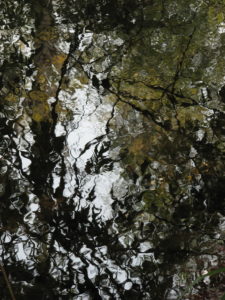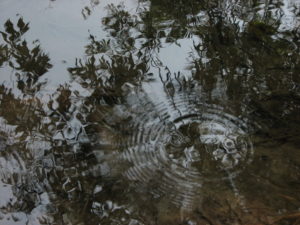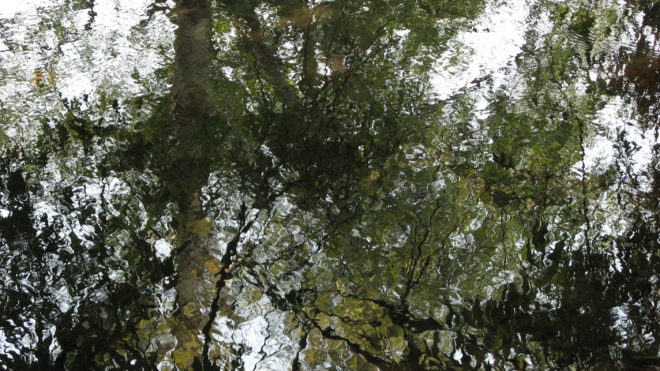The concert begins with the sound of flowing water. Leaves rustling in a breeze, the tap-tap of a woodpecker, and distant chatter of a tree squirrel add to the music of this morning’s symphony along the creek. Coming here – to my sit-spot – is part of my routine, but there’s nothing routine about what I might encounter. Each visit is unique.
Downstream, trees reflect in calm water as if looking in a mirror. In other places, expanding rippling rings overlap other rings as water striders glide across the surface creating ephemeral art with each step. Discernable reflections from a moment ago swiftly transform into a mosaic of shifting colors and patterns when wind ruffles the water.
My fingers stroke flattened, green grass then comb through it, separating bits of thatch, until feeling the cool, moist soil beneath. Microscopic bits of Earth cling to my fingertips and I breathe in the scent, savoring the aroma.
Small birds, undisturbed by my quiet presence, alight in nearby trees. One flits onto a branch only three feet away as if affirming that I’m part of this place. Having a place – like a sit-spot – will do that for you.
What is a Sit-spot?

A sit-spot is a favorite place in nature that is visited regularly to observe our surroundings. It can be anywhere, including a comfy seat by a window or beneath a tree in a backyard.
Incorporating a sit-spot into our lives is a great way to help tune in to our senses and connect to nature.
Sit-spot is a core practice of forest bathing which has proven health benefits that include reduced stress, increased focus and creativity, improved sleep, feelings of well-being and happiness, and more.
Find a Sit-spot
- Locate a place within a five-minute walk of where you live. The closer the distance between your home and sit-spot the easier to keep a routine and reap the benefits of nature.
- Make sure it’s a place you feel safe and comfortable. It might even be a bench in a city park.
- Choose a place with some wildlife activity. Knowing that there are some birds like chickadees and robins, or tree squirrels might help you become more aware of nature close to home and make you feel more connected to it.
- Dress for the weather. You won’t generate much heat so bring an extra clothing layer, hat and gloves if the weather is cool. Sometimes, less-than-ideal conditions (such as overcast skies, light drizzle or wind) create the most memorable outings.
What to do at your sit-spot

- Begin by turning off (or silencing) your phone to avoid distraction. It’s just for a little while
- Use your senses to become present in the moment –Begin by looking around . . . . and up . . . . . and down
- Take a few deep breaths, noticing the sensations as you inhale and exhale
- Feel the air on your face
- Listen to the sounds. You’re bound to hear human-made sounds, but try to focus on natural sounds like birds, moving water, wind in the trees.
- Notice the scents around you – flowers, freshly cut grass, trees
- Bring a notebook or sketch pad to capture some of your observations
- Plan to be there for at least 15 minutes. Time goes quickly when you focus on your senses.
- Get to know the trees and animals. Let them get to know you

